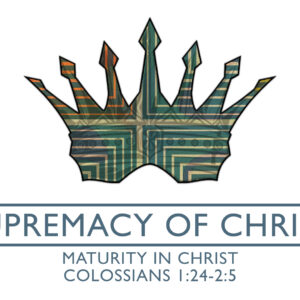Series Summary
Paul’s letter to the Colossians is a brief letter, only 95 verses long, but very significant in impact. Perhaps the most central theme of this short letter is the supremacy of Christ. Paul describes why Christ is sufficient, and what dangers lie in placing our trust in anyone or anything else.
In Colossians, Paul emphasizes the supremacy of Christ in several ways: Jesus is our Creator and our sustainer. Jesus brings redemption and reconciliation. He holds all authority, and is the source of all wisdom and knowledge. And Jesus offers us freedom.
For the Colossians, who lived in a culture dependent upon the power of Rome, Paul’s letter showed them how to trust Christ against the flow of their culture. For believers today, Colossians does much the same thing. We can hold fast to Jesus, in spite of the pushback our culture gives. We can stand strong, leaning on his strength, and not our own. And we can grow in our faith and maturity, standing firm on the authority of Christ in our lives.
In our world filled with diverse beliefs and philosophies, Christ’s supremacy provides believers with a clear foundation for faith. It ensures that we remain anchored in the unchanging truth of Christ’s lordship over everything. This provides hope and assurance, knowing that the one who created and sustains the universe is also the one who redeems and reconciles us to God. This assurance is vital in times of doubt and uncertainty.
As the church, Colossians gives us a solid basis for unity. Christ’s headship over the church reminds us that we are part of something much larger than just ourselves, and that we must work together to present Jesus to the world, and to prevent the influences of the enemy from taking root in our lives, helping us to “walk in a manner worthy of the Lord, fully pleasing to him” (Colossians 1:10).
Sermon Summary
Once Paul gives his clear statement on the supremacy of Jesus, which we looked at last week, he moves to the logical and natural response to who Jesus is: spiritual maturity. As Jesus begins to work within our lives, he begins to grow us and transform us into people who display maturity and grow us into a church that displays maturity. This happens on both the individual level and on the level of the community.
Maturity is displayed in our lives in several ways, and in this passage, Paul lists three ways it can be seen, especially in relation to those around us, and how we interact with one another. So ask yourself, how is your own spiritual maturity? What do you need to do to grow into a deeper level of spiritual maturity in your life? Let’s do this… and let’s do this together!

